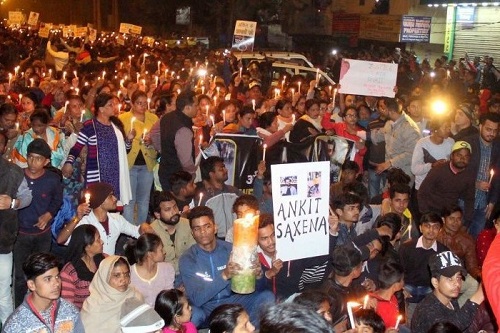PTI photo
By
Ananya S Guha
The brutal killing of Ankit Saxena brings to the fore certain questions rather intriguing ones, about Indian society, but we have to face these questions. Did the father of the girl he loved kill him because he was a Hindu, or that he objected to the match, because he did not think it appropriate that they get involved (too young, not a good match, not from a ‘good’ background, etc). Of course we have all jumped to the Hindu Muslim entities, rightly or even wrongly. The issue is the divide and gulf that exists between the two. The young man did not give a thought to it. Not even the girl maybe. But we do, and we are convinced that we know why it happened.
In the midst of course more hatred will be fanned. An eye for an eye theory. Why is all this going awry in India? It does not happen because of one incident. The genesis is in the past. Killings over the cow issue, love jihad, a young man being killed on the eve of Id? Don’t we remember? And with each incident the divide becomes wider, the wounds cut deeper. And such wounds transfer into hatred, even murder. One Ashraful will lead to another, no matter who the person is. The context leads to a bizarre text, where sheer hatred is the protagonist.
In this case caution is advocated by no less than Ankit’s father. The hatred however is being sowed deeper and deeper. The chasm is becoming wider. But the formula for hatred necessitated by political expediency is clear. The writing is on the wall. It says we hate one another. But no one is interested to find out the reason, to examine the country’s checkered history since Independence, even before it. Within India nations exist. They are the soul. And if the soul is hurt, the body will wince, the body will rebel, the body will retrograde.
Poor Ankit, he did not understand that he fell in love wrongly. His was the text, not the context. Trapped in this vicious cycle of history and present developments, it is only innocent people making the bulwark of the country, who are mauled and murdered. An entire people, the community, the caste or class suffer because of it. Nothing is finite, it is a long chain of opprobrium, hatred and surrender, to the ignominious truth. They suffer it. But the backlash comes from the people who can be exploited, the unemployed; by the people masquerading as leaders. Even love has been anatomized in the most bizarre and brutal manner. Inter faith marriages have been dubbed as jihads. Ashraful was killed as a suspect of this vermin- ‘love jihad’. Incongruities are spelled upon, when there are none. Things imagined become reality, reality which is purged of truth leading to death. And this is slowly but surely building up as slow poison, gnawing into an otherwise organic society.
It is in this context that Ankit Saxena’s brutal murder has to be viewed. The cause again was love, an ante jihad, or an obverse jihad. The perpetrator thought that his daughter and her lover was perversely errant. Ankit loved wrongly and had to pay the price.
Underneath, society has become so fractious and hateful that neighbors cannot tolerate each other. Walls have been built and our prismatic chains tether us to the worst kind of malice. Otherwise how can such insane murders take place in such broad daylight? Ankit’s father has been a symbol of faith and tolerance despite the tragedy. The occult in India can work mystic ways. We have to now reinforce things beyond religion, caste and community, we have to re appraise and re admit love. We have to perceive individuals as individuals. Who will take the lead? If political expediency transcends everything else, what is left of the country? If religiousness and religiosity are confounded as worst aberrations, like the jihadists themselves, then where is the difference? Where are our ancient virtues, that we proclaim again and again? Can wrongs be answered only by wrongs?
Once and for all the context must be totally reorganized and dismantled. For once we must realize that the common culture of all is societal good, well being and decent living. To the impoverished religion is secondary, and that one can say with absolutism. The common good has been misrepresented. The common good lies only in not the stratification of diversity but its unity. Victims like Ankit, young as they are, have fallen prey to the vicious deceits and lies of a polity, having a long history of distrust, suspicion and the country though again and again pilfered by the process of absorption, cultural, religious, whatever one may call it.
And we have to abide by this absorption if we are to endure as a Nation.
Ananya S Guha
Ananya S Guha was born and brought up in Shillong, North East India. He has seven collections of poetry and his poems have been published worldwide. They have also been featured in several anthologies. He is also a columnist, critic and editor. He now is a Regional Director at the Indira Gandhi National Open University and holds a doctoral degree on the novels of William Golding.



No Comments Yet!
You can be first to comment this post!